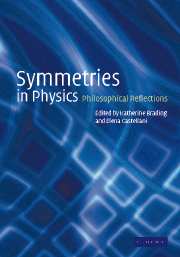Book contents
- Frontmatter
- Contents
- List of contributors
- Preface
- Copyright acknowledgements
- 1 Introduction
- Part I Continuous symmetries
- 2 Classic texts: extracts from Weyl and Wigner
- 3 On continuous symmetries and the foundations of modern physics
- 4 The philosophical roots of the gauge principle: Weyl and transcendental phenomenological idealism
- 5 Symmetries and Noether's theorems
- 6 General covariance, gauge theories, and the Kretschmann objection
- 7 The interpretation of gauge symmetry
- 8 Tracking down gauge: an ode to the constrained Hamiltonian formalism
- 9 Time-dependent symmetries: the link between gauge symmetries and indeterminism
- 10 A fourth way to the Aharonov–Bohm effect
- Part II Discrete symmetries
- Part III Symmetry breaking
- Part IV General interpretative issues
- Index
6 - General covariance, gauge theories, and the Kretschmann objection
Published online by Cambridge University Press: 08 October 2009
- Frontmatter
- Contents
- List of contributors
- Preface
- Copyright acknowledgements
- 1 Introduction
- Part I Continuous symmetries
- 2 Classic texts: extracts from Weyl and Wigner
- 3 On continuous symmetries and the foundations of modern physics
- 4 The philosophical roots of the gauge principle: Weyl and transcendental phenomenological idealism
- 5 Symmetries and Noether's theorems
- 6 General covariance, gauge theories, and the Kretschmann objection
- 7 The interpretation of gauge symmetry
- 8 Tracking down gauge: an ode to the constrained Hamiltonian formalism
- 9 Time-dependent symmetries: the link between gauge symmetries and indeterminism
- 10 A fourth way to the Aharonov–Bohm effect
- Part II Discrete symmetries
- Part III Symmetry breaking
- Part IV General interpretative issues
- Index
Summary
Introduction
Two views…
When Einstein formulated his General Theory of Relativity, he presented it as the culmination of his search for a generally covariant theory. That this was the signal achievement of the theory rapidly became the orthodox conception. A dissident view, however, tracing back at least to objections raised by Erich Kretschmann in 1917, holds that there is no physical content in Einstein's demand for general covariance. That dissident view has grown into the mainstream. Many accounts of general relativity no longer even mention a principle or requirement of general covariance.
What is unsettling for this shift in opinion is the newer characterization of general relativity as a gauge theory of gravitation, with general covariance expressing a gauge freedom. The recognition of this gauge freedom has proved central to the physical interpretation of the theory. That freedom precludes certain otherwise natural sorts of background spacetimes; it complicates identification of the theory's observables, since they must be gauge invariant; and it is now recognized as presenting special problems for the project of quantizing of gravitation.
…that we need not choose between
It would seem unavoidable that we can choose at most one of these two views: the vacuity of a requirement of general covariance or the central importance of general covariance as a gauge freedom of general relativity. I will urge here that this is not so; we may choose both, once we recognize the differing contexts in which they arise.
- Type
- Chapter
- Information
- Symmetries in PhysicsPhilosophical Reflections, pp. 110 - 123Publisher: Cambridge University PressPrint publication year: 2003
- 16
- Cited by



